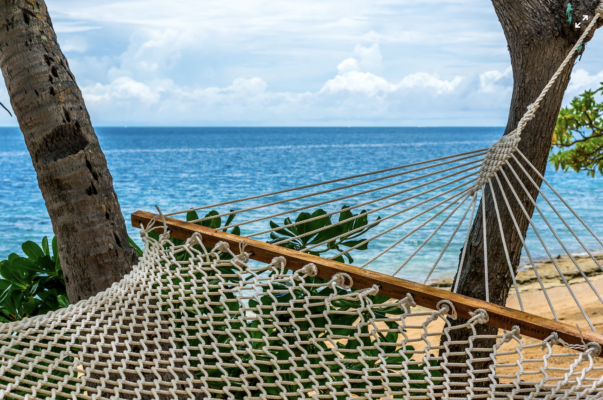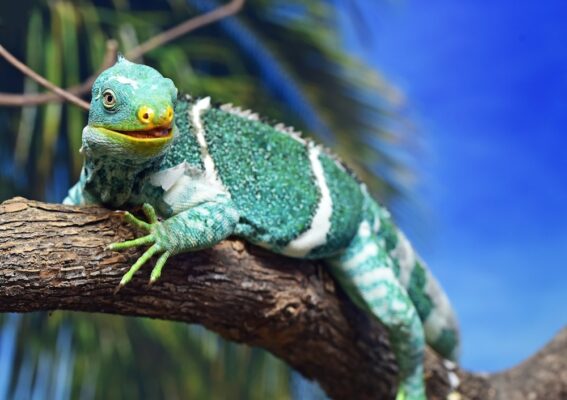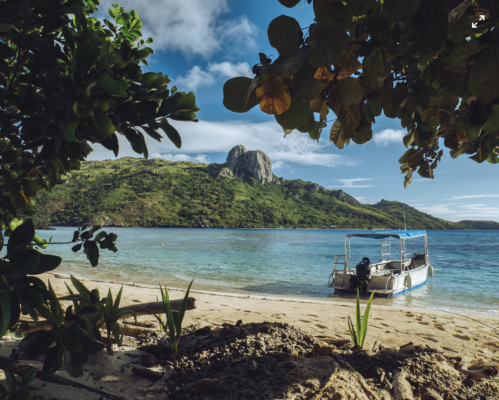Whenever I tell someone I’m half Fijian they look at me confused, not knowing what that is. Not until I say “you know, like the bottled water” do they understand what I mean by Fiji. For those who still don’t know, I explain that Fiji is a small island country in the South Pacific Ocean. Anyone can agree that it has the most beautiful scenery from its luscious green palm trees to its crystal clear blue waters.

My grandma, Sheila Singh, was born in 1947 in Nausori, Fiji, and raised in Suva, Fiji. Until the age of 29, she lived an adventurous life in Fiji, then moved to Canada. Throughout my childhood, she would tell me many stories and facts about the island. It always interested me to discover more about my heritage and origin. Since most of the people around me barely know what being Fijian means, I want to share about my grandma’s life in Fiji and her experience of moving to Canada.
Growing up, my grandma would spend lots of time participating in different activities. She would play lots of sports and games with her family and friends. They enjoyed playing basketball, soccer, baseball, and many other random games. They were very competitive and took their games pretty seriously.
“I was the shortest one in my class, but had so much energy. I used to come first all the time,” said my grandma.
Children were constantly out during these activities because of the sunny and hot weather. In Suva, it would occasionally rain, but it would still be very hot and blazing. The usual weather was very sunny and tropical in Fiji.
My grandma says, “we were wishing to, you know, get a little bit cooler, but no”. And even though she used to wish for this, she claims to “miss the weather since it’s so cold here,” which makes sense. Who wouldn’t miss those tropical summery days?
The hot weather called for wearing certain clothing. They wore many little dresses and flip flops or sandals. They didn’t have running shoes or sweatshirts, but minimal clothing because it was always so warm.
“We never used to wear sweaters. We didn’t know what [they were] even,” my grandma said. “We had uniforms in school and they were pink in primary school. Then I went to high school and we were wearing white and blue. Everybody was very clean. You had to wash your dress and put starch [on it] yourself with cassava.”
The cassava starch used to keep the uniforms neat and pressed, it was made by my grandma and her classmates when they had to wash and clean their uniforms for school. In Fiji, school was generally very strict and disciplined. They had a harsh policy to keep students clean and free from any diseases or lice. If a student came to school dirty, they would immediately be sent home.
“Every morning you had to show your handkerchiefs to the teacher, and your fingernails. If your fingernails were a little bit big, they’d just hit you with ruler, so hard,” my grandma said to me.
Going to school every day was also hard work for students. There was no bus, so they would have to walk about three miles to and from their school. They had to make their own food to take to school, but the way they took it was different from how most students do today.
“We used to make roti and curry and wrap it and take it to school,” said my grandma. “We used to wrap it in newspaper and sometimes it was so yucky because the ink would seep through.”
This was too bad because the food in Fiji is, in my opinion, the most delicious and flavorful in the world. From curry with rice and roti to dhal, a lentil soup with many spices, it is all so good and I’m always grateful whenever my grandma makes it for me. There are many different kinds of curries my grandma makes like steak, chicken, lamb, or okra. My favorite is bean curry. I also love eating it with roti, a flatbread made from flour and water which is used to pick up the curry and eat with. Chutney, a condiment made out of fruits, vegetables, and spices, is another tasty and spicy food made in Fiji.
As Fiji is extremely tropical, there are many exotic fruits which grow there. Star fruit, soursop, rambutan, and guava are all really popular for eating there. Of course, they also have tropical fruit which are common here like coconuts, pineapples, dragon fruit, and mangos. But they are so much better when they are grown and eaten in Fiji.
When my grandma was growing up, they planted all kinds of fruits and vegetables which were easily accessible for them to eat. With her family, she lived on about 10 acres of land where they had their own farm with countless crops and animals. Occasionally, they would go to the market to get meat like lamb and crab, but for the most part they would eat what was provided from their huge farm. Even though they had this farm, and lived on an island, water wasn’t always easy for them to get. Their main source of drinking water was taken from a well.
“We had to tie a rope in a bucket, put it inside [the well], and take the water out. Sometimes a frog [would] get in there and jump out, then we’d drink the same water” said my grandma.
While most of us get scared or grossed out by certain animals and insects, it was normal for them to roam around in Fiji. They could be found anywhere, a little snake in the water or an iguana on a tree. They were, and still are, native to the land, and can be extremely unique and exotic. People who lived in Fiji weren’t bothered by them because they were so common.
“In Fiji, I was sleeping and a lizard fell on my head. I just picked it up and threw it outside,” said my grandma.

Finding insects and animals in houses was very ordinary in Fiji. On her farm, my grandma lived in a three bedroom house with her family, which was built by her father. They didn’t have toilets or toilet paper in this house, and had to use pit toilets. There was also no electricity in their house. This meant no lights, TVs, or irons.
“We had a stove but we made [it] ourselves. We used to [take] wood and little bit of kerosene and then light and then cook the food ourselves,” says my grandma.
Living in a three-bedroom house was extremely packed with how big my grandma’s family was. Back then, it was normal to have pretty large families. My grandma had twelve siblings, six sisters and six brothers. Although it’s easy to assume that there was lots of bickering or fighting, my grandma and her siblings were super close.
“We never used to fight, just like no fighting… we used to play outside all the time and go visit our friends and neighbors,” my grandma said to me.
When she was young, my grandma never planned to move away from Fiji. But when the rest of her siblings began moving away, she wanted to stay close with them.
“My older brother came to Modesto, California. And then he called my second brother, then my second brother called my other sisters and brothers [over]. But my youngest brother was in Vancouver, Canada, [and] he sponsored me and I went there. So, I have only one brother in Canada and the rest in the United States,” said my grandma.
When my grandma went to Canada, it wasn’t easy. At that time, she had three small kids, two sons and a daughter (my mom). When they first got to Canada, they stayed with her brother for six months. Her husband would work hard at his job, earning $2.50 an hour so that they could rent a place. My grandma would stay and take care of their kids. After a few years, she ended up having a fourth child, and this made it all super hard. It was difficult adjusting to all of the differences from Fiji to Canada. She really missed her old home.
“At first I regretted [it]. I couldn’t sleep [at night]. I was crying. I told my husband, ‘let’s go to Fiji, let’s go to Fiji. It’s too cold and the houses are so different here,’” my grandma said.
But as time went on and years passed, it began getting easier. When her children were older, my grandma began working. After furthering her education, she opened her own licensed daycare. She loved taking care of children and wanted to make it into her career.
I remember being younger and going to my grandma’s house. She would have this huge, or at least it seemed to be at the time, glass sliding door which separated the daycare area of her house from the rest of it. My brother and I would have the best times playing with all of the different toys from the daycare, there were so many of them. It was amazing, and definitely a core memory of ours.
Now, my grandma is super happy and grateful for the life and family she has built in Canada. Although she can’t decide which place she prefers, as she loves them both, she has noticed certain differences between the two.
“Canada is a huge place with [many opportunities]. Fiji is just a small island, but people are very happy [because] the weather is so nice. In Canada, lots of people [can be] miserable. [In Fiji], we didn’t know about alcohol or drugs and stuff. Kids were so good because they grew up very strictly,” said my grandma. “They were happy and free.”

It can be certain that every place has its good and bad qualities. My grandma has seen it all, from a tropical and tiny island to a cold and huge country with many people. She has lived the best of both worlds and, in a way, two different lives. She loves both and is thankful for the life in both. It will always be important for her to stay close with family, the reason for her move. I am forever grateful for her strong bravery and huge decisions because it has allowed for our family to grow and be where we are today. I love our life out here, but Fiji will always continue to fascinate me. Someday, I will go and see the place where the memories of my grandma originated with my own eyes.
Jada is a high school student at Inglemoor High School. She was a fellow in the 2023 pilot Story Gathering Workshop, a program that gave twelve students the opportunity to write and publish an article for our news outlet, Voices.

Be a part of our movement to share and celebrate the diverse stories of our ethnic communities
Our Northwest cultural communities have powerful stories to tell. Your support can help us amplify these voices. Donate $5 or $10 today and follow us to stay connected with the latest updates.